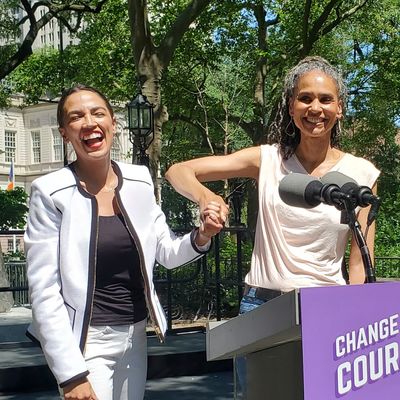
On June 5, Congresswoman and progressive firebrand Alexandria Ocasio-Cortez endorsed Maya Wiley as her first choice in the upcoming ranked-choice Democratic primary for New York City mayor, boosting the candidate who many now see as the only viable progressive left in the race. “If we don’t come together as a movement, we will get a New York City built by and for billionaires, and we need a city by and for working people — so we will vote for Maya No. 1,” Ocasio-Cortez said during a press conference in front of City Hall on Saturday. Ocasio-Cortez called Wiley, a civil-rights attorney and former MSNBC legal analyst who did a stint in the de Blasio administration, “a candidate who can center people, racial justice, and economic justice.”
“I am so humbled and proud to be held up by this kind of courage,” Wiley responded after Ocasio-Cortez spoke.
Ocasio-Cortez wasn’t the only big-name progressive in the city to get behind Wiley on June 5: Congressman Jamaal Bowman said he was endorsing her, too — now the fifth House member to back Wiley. Bowman was one of many public officials who retracted their endorsements for the one-time leading progressive in the race, comptroller Scott Stringer, after he was accused of sexual misconduct by a former campaign volunteer. (A second woman has since come forward with similar allegations against Stringer.) On Friday, the progressive Working Families Party named Wiley its No. 1 choice in the race, as well (it had originally ranked her as its third choice, behind Stringer and Dianne Morales). In February, Wiley picked up a big endorsement from SEIU 1199.
On June 7, Wiley got another progressive nod — this time from outside the city:
With the recent implosion of Morales’s campaign amid a labor dispute among her staff, Wiley appears to be the last progressive standing. The current front-runners in the crowded race — to the extent that sparse public polling can indicate who is leading ahead of the city’s first-ever ranked-choice mayoral primary — are all moderate Democrats: Brooklyn borough president Eric Adams, former presidential candidate Andrew Yang, and former sanitation commissioner Kathryn Garcia (who received the last major endorsement in the race, from the New York Times).
Ocasio-Cortez did not name any other candidates as her recommended second or third choices in the primary; it’s not yet clear if she will. Indeed, it hadn’t been clear whether or not Ocasio-Cortez (or Bowman, again) would endorse anyone for mayor until Saturday. How much of an impact these and other late endorsements will or can have on the race, with the start of early voting just one week away, remains to be seen.
As Intelligencer contributor David Freedlander noted a few weeks ago, Wiley had previously struggled to capitalize on the controversies that engulfed her progressive rivals. Freedlander tweeted Saturday that the socialist left has viewed Wiley with some skepticism thus far, and noted that the campaigns of Eric Adams and Andrew Yang both have more than double the cash on hand as Wiley’s campaign does heading into the final two weeks of the race. On the other hand, there is a recent historical precedent for mayoral candidates in crowded races winning because of well-timed late surges:
Adams, who was oft-targeted by other candidates in the second mayoral debate held earlier this week, released a blistering statement on Saturday attacking both Ocasio-Cortez and Wiley, claiming they “want to slash the police budgets at a time when Black and brown babies are being shot in our streets, hate crimes are terrorizing Asian and Jewish communities, and innocent New Yorkers are being stabbed and shot.”
Yang campaign co-manager Chris Coffey made a point to simply congratulate Wiley, instead.






























